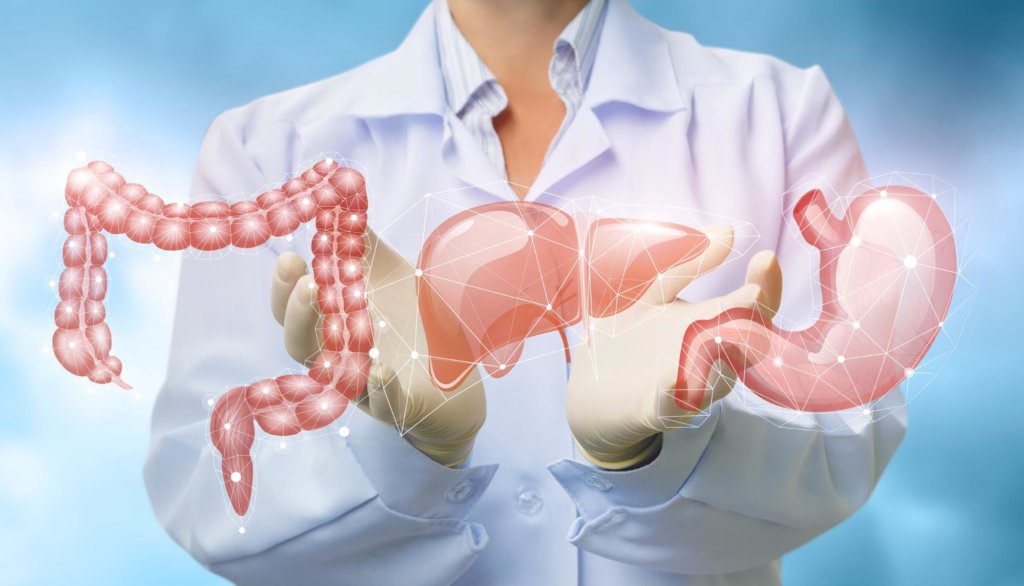How Your Digestive System Works

At Birmingham Gastroenterology, we have decades of experience treating diseases and disorders of all parts of the digestive system. While each case we treat is unique, we aim to educate and inform so that our patients can feel confident that they are in good hands. Having a basic understanding of the structure and function of the digestive system allows you to take charge of your gastrointestinal health and gives context to the procedures and treatments we offer. Many of our patients experience GI problems and wonder, “is this normal?” The first step to answering that question is understanding normal digestive function.
There are ten key players when it comes to your digestive tract. Each part of your body has a specific function to promote healthy and regular digestion. Here’s how all of these parts of the body come together to turn your food into energy.
Mouth
You may be surprised to find out that digestion begins before you even consume any food. Sights and smells of food promote salivation, so when you start chewing and breaking the food into digestible pieces, the saliva continues the breakdown process allowing your body to absorb the nutrients. Once you swallow, the food then gets passed down to the esophagus.
Esophagus
The esophagus has many moving parts to ensure the safe transfer of food from the mouth to the stomach. One of these parts is the epiglottis, which prevents choking by blocking food from entering the windpipe when you swallow. The esophagus is also home to the lower esophageal sphincter which contracts to keep food from coming back up from the stomach to the esophagus. Dysfunction of this sphincter may result in heartburn or acid reflux.
Stomach
The stomach stores the food and mixes in enzymes and acid to continue to break down the food for use. While the stomach plays a role in how your digestive system works, some may be surprised to find that it really just serves as a hollow vessel to prepare the food for the small intestine.
Small Intestine
The small intestine is responsible for actually absorbing the nutrients from the food. While food may enter the small intestine in a semi-solid state, it will leave in a completely liquid form. It is at this stage that bile from the liver and enzymes from the pancreas aid in the continuous breakdown process.
Pancreas
In addition to providing enzymes to the small intestine, the pancreas is also responsible for the production and transfer of insulin into the bloodstream. Insulin allows your body to metabolize sugar.
Liver
The liver allows for the processing of the nutrients. In this processing stage the liver takes what has been absorbed by the small intestine and turns it into chemicals to help the body function properly. The liver is also responsible for detoxing any harmful chemicals or substances such as alcohol.
Gallbladder
The gallbladder acts as a storage facility for the bile that the liver creates and that the small intestine needs to break down and process the nutrients from the food.
Large Intestine (Colon)
Everything that cannot be absorbed by the body becomes waste, and the colon is responsible for processing that waste. As the liquid waste passes through the colon, the water is removed and the waste becomes solid. This waste, also known as stool, contains mostly food debris and good bacteria. Once the colon becomes full of stool, it begins to empty to the rectum to begin an elimination process.
Rectum
The rectum serves as a connection between the colon and the anus, as well as a signaling device to the brain. Once the stool is transported to the rectum, your brain will be notified that you need to go to the bathroom. Once you make it to the bathroom, the sphincter relaxes and allows the stool to be passed on to the anus.
Anus
The final part of the digestive tract, the anus helps to determine if the rectal contents are liquid solid or gas. The anus is surrounded by sphincter muscles that allows for the control of the stool and prevent the stool from coming out involuntarily. Once the stool is released, the digestive process is complete.
Contact Birmingham Gastroenterology
If you are experiencing issues with your digestive system, contact the team at Birmingham Gastroenterology Associates. We can help diagnose digestive problems and work with you to help your digestive system regain its normal function. To make an appointment to discuss your symptoms and treatment options, call us at (205) 271-8000.

